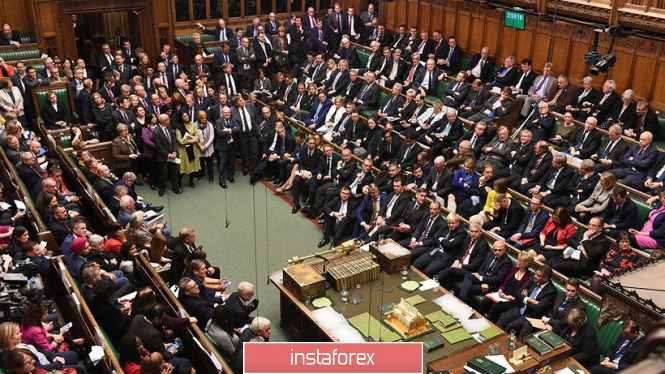A political show called Brexit continues. Deputies of the House of Commons on Saturday could not put an end to the three-year epic of the negotiation process between London and Brussels: according to the results of the vote, the situation remained in limbo. Many journalists have already managed to "put an end" to the soft Brexit scenario, although in my opinion it's too early to draw such conclusions.
The pound's first reaction to Saturday's events was negative, but not catastrophic. The GBP/USD pair opened the trading week with just a 30-pound downward gap, but it returned to the 29th figure at the end of the Asian session. This suggests that traders did not interpret what was happening as a "failure", taking a wait-and-see attitude on the eve of the key events of this week.

In general, we can admit that Johnson's blitzkrieg has failed, and now the issue of approving the deal is again moving into a longer-lasting phase. Traders went through all this: at the end of last year, Theresa May agreed on a deal with the EU in the same way, but could not convince Parliament to support this deal, despite some compromises from Brussels. At first glance, Johnson is now repeating the path of the previous prime minister. However, these situations cannot be blindly compared, projecting the political failure of Theresa May with the possible failure of Boris Johnson. Both de jure and de facto circumstances are significantly different.
Let me remind you that in January of this year, the Lower House of the British Parliament rejected the deal proposed by May: only 202 deputies voted in favor, while 432 MPs voted against. The deal was rejected with a difference of 230 votes, which, by the way, was the largest defeat of the British prime minister in Parliament over the past almost one hundred years. But this is not a matter of records or counter-records: the important thing is that at that time the British Parliament actually turned away from Brexit's further fate (May initiated the postponement), while now the deputies are ardent opponents of the "hard" scenario, legislatively regulating the government's next steps in this matter.
By and large, the deputies of the House of Commons on Saturday adopted a "Solomon decision": on the one hand, they did not approve the proposed deal, but on the other hand they did not formally reject it. Instead, they adopted Oliver Letwin's amendment, which prohibits voting on a deal until British law is "ready" for an orderly exit from the European Union. In other words, British MPs must vote for laws to replace EU law with English law: MPs supported the initiative with 322 votes to 306. At the same time, MPs ordered Johnson to ask Brussels to postpone Brexit until the beginning of next year.
The British prime minister really appealed to the EU leadership, formally fulfilling the requirements of the law. However, he sent to Brussels not one appeal, but three. He did not sign the first letter (although it is certified by the government office): this is the so-called "compulsory" appeal for a deferment. Johnson signed the second letter, and called it a "personal request." This appeal says that the Cabinet of Ministers and he personally considers the delay of Brexit a mistake. At the same time, he assures his European colleagues that the government will do everything to conduct an agreed deal through Parliament, having implemented Brexit by October 31. The third note, as it were, places "all the dots on i": it explains that the first letter was sent as an execution of the law, while the position of the government is reflected in the second appeal. Moreover, according to the British press, Johnson phoned almost all European leaders and stated that the request for a postponement is de facto not his request, but the deputies of the House of Commons.
The logic of such maneuvers is obvious: Johnson wants to get rejected by Brussels, thereby pushing the Parliament to approve the deal, on the principle that "a bad world is better than a good war". For the same purpose, an emergency action plan called "Yellowhammer" was launched on Downing Street, which was developed in case of withdrawal from the EU without a deal. An emergency government meeting was held in connection with the "increased risk of the implementation of a hard Brexit." In other words, Boris Johnson returned to the tactics of escalating the situation in order to persuade as many deputies as possible in favor of approving the deal. Theresa May also used a similar strategy, although some Labour are now ready to support the prime minister, which was not the case with May.

It is worth noting that the pound is holding at a given height and for another reason - according to British and European journalists, Brussels is ready to grant a respite to Brexit even on the basis of Johnson's "formal" appeal. That is, in fact, now the fork in events consists of two options: either London has time to adopt the corresponding package of laws and approves the deal, or Europe again extends the negotiation process.
The British prime minister assured that the cabinet would submit to the Parliament all the bills referred to in the Letwin Amendment on Tuesday (according to other sources, even today, on Monday). But there are pitfalls: the fact is that MPs can make amendments to the aforementioned laws, the approval of which can prolong the epic with Brexit for a few more months. For example, Laborites have recently been actively lobbying for the idea of a referendum on the proposed deal. In addition, it is possible that the opposition will put forward a vote of no confidence in the government, which will lead to early elections. If at least one of these issues is met by Parliament, a delay in Brexit will be inevitable.
Thus, in the coming days, the GBP/USD volatility storm will resume. If Johnson nevertheless "pushes" the deal in Parliament, the price will jump by several figures. Otherwise, a significant pullback is expected for the pair, to the area of 24-25 figures.
The material has been provided by InstaForex Company - www.instaforex.com